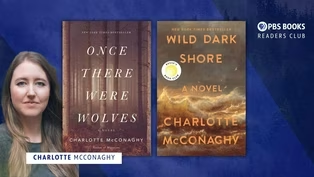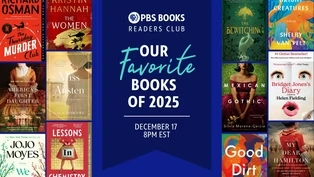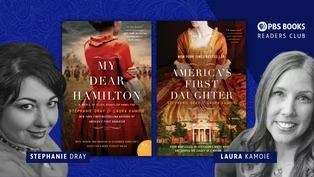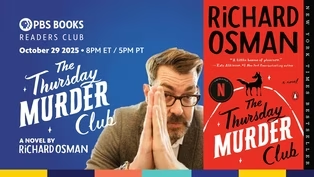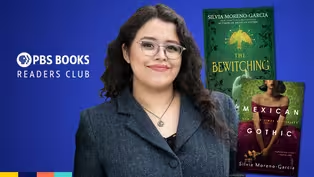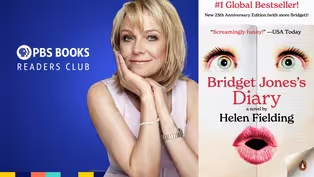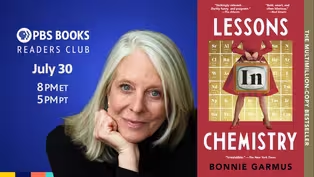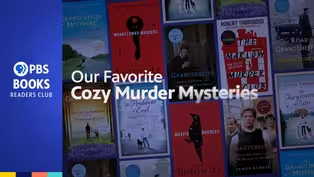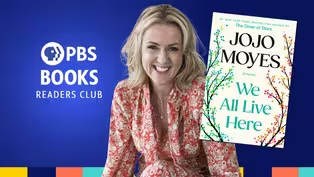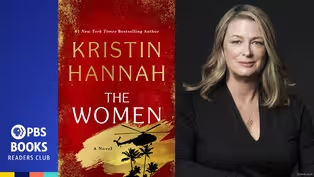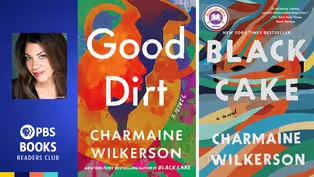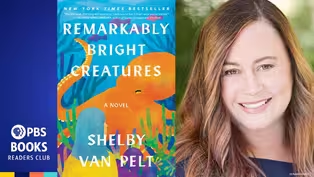
Readers Club | Ep. 204: Miss Austen | Gill Hornby
Season 2025 Episode 23 | 51m 18sVideo has Closed Captions
PBS Books Readers Club welcomes international best-selling author Gill Hornby to discuss her novel
PBS Books Readers Club welcomes international best-selling author Gill Hornby to discuss her novel Miss Austen.
Problems playing video? | Closed Captioning Feedback
Problems playing video? | Closed Captioning Feedback

Readers Club | Ep. 204: Miss Austen | Gill Hornby
Season 2025 Episode 23 | 51m 18sVideo has Closed Captions
PBS Books Readers Club welcomes international best-selling author Gill Hornby to discuss her novel Miss Austen.
Problems playing video? | Closed Captioning Feedback
How to Watch PBS Books
PBS Books is available to stream on pbs.org and the free PBS App, available on iPhone, Apple TV, Android TV, Android smartphones, Amazon Fire TV, Amazon Fire Tablet, Roku, Samsung Smart TV, and Vizio.
Providing Support for PBS.org
Learn Moreabout PBS online sponsorshipMore from This Collection
The PBS Books Readers Club is a monthly digital-first series that brings its members into conversations behind the stories of your favorite books & shows. You can watch the online on the PBS App, with extended interviews available for PBS members on PBS Passport.
Readers Club | Ep 301: Charlotte McConaghy | Once There Were Wolves
Video has Closed Captions
PBS Books Readers Club hosts author Charlotte McConaghy to discuss her novel Once There Were Wolves. (58m 55s)
Readers Club | Ep. 212: Our Favorite Books of 2025
Video has Closed Captions
PBS Books Readers Club celebrates the wrap of its second season with a highlight of 2025 (47m 55s)
Readers Club | Ep. 211: America's First Daughter | Stephanie Dray & Laura Kamoie
Video has Closed Captions
PBS Books Readers Club welcomes co-authors Stephanie Dray and Laura Kamoie (1h 1m 45s)
Wed Oct 29 2025 | Readers Club | Ep. 210: Richard Osman | Thursday Murder Club
Video has Closed Captions
PBS Books Readers Club welcomes celebrity writer Richard Osman to discuss his best-selling novel (52m 44s)
Readers Club | Ep. 209: Silvia Moreno-Garcia | The Bewitching and Mexican Gothic
Video has Closed Captions
PBS Books Readers Club welcomes award winning author Silvia Moreno-Garcia to discuss her new book. (52m 42s)
Readers Club | Ep. 208: Helen Fielding | Bridget Jones's Diary
Video has Closed Captions
PBS Books Readers Club welcomes beloved British author Helen Fielding to discuss her iconic novel (59m 30s)
Readers Club | Ep. 207: Lessons in Chemistry | Bonnie Garmus
Video has Closed Captions
PBS Books Readers Club welcomes international best-selling author Bonnie Garmus to discuss her novel (49m 3s)
Readers Club | Ep. 206: Our Favorite Cozy Murder Mysteries
Video has Closed Captions
PBS Books Readers Club hosts a special event sharing Our Favorite Cozy Murder Mysteries (52m 32s)
Readers Club | Ep. 205: We All Live Here | Jojo Moyes
Video has Closed Captions
PBS Books Readers Club welcomes international & New York Times best-selling author Jojo Moyes (57m 37s)
Readers Club | Ep. 203: The Women by Kristin Hannah
Video has Closed Captions
PBS Books Readers Club welcomes international best-selling author, Kristin Hannah to discuss novel. (53m 29s)
PBS Books Readers Club | Ep. 202: Good Dirt & Black Cake | Charmaine Wilkerson
Video has Closed Captions
PBS Books Readers Club is delighted to welcome critically acclaimed author Charmaine Wilkerson (55m 29s)
PBS Books Readers Club | Episode 201 | Remarkably Bright Creatures | Shelby Van Pelt
Video has Closed Captions
PBS Books Readers Club launches season two with award-winning author Shelby Van Pelt. (57m 40s)
Providing Support for PBS.org
Learn Moreabout PBS online sponsorship(bright instrumental music) - But Cassandra didn't just do Jane's reputation a service by burning so many letters, she did me a great service as well.
Because she created all these holes in Jane's life story and it was into there, into those pockets that I could put my imagination.
(bright instrumental music continues) - Well hi, and welcome to the PBS Books Readers Club.
- Today, we're so excited to be welcoming author, Gill Hornby, to discuss her delightful book, "Miss Austen."
- "Miss Austen" opens in 1840s England, two decades after Jane Austen's death, as her elderly sister, Cassandra, works to collect and destroy Jane's letters.
But instead, she uncovers secrets that reveal not just truths about Jane, but Cassandra herself.
- This novel beautifully blends youthful romance with the hard-earned wisdom of experience as Cassandra reflects on her time with her brilliant, complicated sister, confronting very truths about Jane's life and her own.
- Fans of Jane Austen classics will love revisiting this world of well-mannered drama in this novel, and in the upcoming PBS Masterpiece series, premiering May, 4th.
- Hi, I'm Fred Nahhat here with Lauren Smith.
Princess Weekes is our literary expert and author, and Heather-Marie Montilla, our resident librarian and PBS Books national director.
- And of course we also want to know what you think.
Share your thoughts on "Miss Austen" in the comments.
Did it capture the world and wit of Jane Austen for you?
We love reading and responding to your comments in the chat, so please leave us some.
- And don't forget to join the PBS Books Readers Club FaceBook group to connect with other book lovers, share recommendations, and get involved in ongoing discussions all month long.
- [Lauren] It is the best book club ever.
- Yeah.
- Do you not agree?
It's so great.
These folks give amazing recommendations.
And don't forget to share this event.
Great books are even better when you enjoy them with friends.
- Friends.
- Yes.
- So good.
Click Share right now on FaceBook or YouTube, and it will help us more than you know.
We're very grateful.
- All right, so let's discuss Gill Hornby's charming novel, "Miss Austen."
What'd y'all think?
- I loved it.
I thought it brought me back to Jane Austen, to childhood when I read her books, and really, it was about, for me, the power of sisterhood.
- Yeah.
Well, they had no other options, right?
- Right.
- So many of them.
- And so they had to rely on each other.
- Yeah.
- Yes.
- I am a huge Jane Austen fan, and I love "Pride and Prejudice".
So it was just fun seeing how Jane was not only pulling from her own life experiences and all those sisterly dynamics as you mentioned, but also giving voice to single women.
- Yes.
- I think it's so under-established how little room women had to operate in this time.
And a lot of what Jane was doing was just truly extraordinary, then and now.
- Yes.
- So it was great to be reminded of that.
And I love whenever we have a protagonist that's actually over 60.
(Princess laughing) - Yes.
- I love that.
We've had a few of them.
- Yeah, exactly.
- On PBS Books Readers Club.
We love it.
(Princess chuckling) - Well, I will say in the world of Jane Austen fans, I may not be the biggest fan, but what this book did for me is it explored a world beyond her novels.
It kind of expressed, I picked up on this thing with sisterhood.
I have four sisters.
I know what that dynamic is all about.
And the blend of characters also I found interesting, but the author's reimagining, which becomes so popular now.
It's fascinating work to me to put yourself in the shoes, in the soles of these characters.
It's a dynamic piece of writing.
- Well, it almost felt like reading a Jane Austen novel.
She captured the world and the style really well.
And I love how there's some little nuggets and Easter eggs, references to Jane Austen.
There's the fall that happens in "Miss Austen," sort of a reference back to the fall and Lyme in "Persuasion", and some of the comparisons between Jane and Elizabeth Bennett.
Little things like that were just so fun to read as a Jane Austen fan.
- Exactly, and thinking about how, essentially, Jane from "Pride and Prejudice" is essentially kind of Cassandra, like the beautiful, funny one, and Elizabeth is very much Jane, like, I talk too much and make bad decisions.
But we love it for you.
- Yeah.
- Well, we have so much to discuss with Gill Hornby, but first, let's talk about how you could join the conversation.
- Sign up for our PBS Books e-newsletter at www.pbsbooks.org/subscribe for exclusive book recommendations, author interviews, and more.
It's a fun way to get the latest book updates straight to your inbox.
- And follow PBS Books on FaceBook, Instagram, and YouTube for engaging discussions.
Did you know we have hundreds of author interviews and other interesting stories to explore on the PBS Books YouTube channel?
Definitely go subscribe there if you haven't already done that, and get ready to go down that rabbit hole of books and authors.
- [Lauren] And if you love The PBS Books Readers Club, consider supporting your local PBS station.
This program and your PBS station are counting on support from viewers just like you now more than ever.
So please, if you can, visit www.pbsbooks.org/donate to make a gift.
- [Fred] Www.pbsbooks.org/donate will take you right to your local station's giving page.
There, among many thank you gift options, you can support this program directly by choosing a PBS Books eBook of "Miss Austen" or any of our PBS Books features.
After you donate, you will get an email with a special code from your station, and then you can go and pick out your eBook.
- Or you can select our official PBS Books Readers Club mug, just like we have here on set.
"My weekend is booked," and isn't that the truth?
- And we love it.
We also love our PBS station members, and when you become a member of your local PBS station by making a qualifying donation, you will get access to PBS Passport where you can stream full seasons of incredible PBS shows, including the Masterpiece adaptation of "Miss Austen."
If you enjoyed reading Jane Austen novels and Gill Hornby's fresh take on the Austen sisters, well, then you're gonna love watching them come alive on screen.
- Masterpiece, "Miss Austen", premieres on PBS on May 4th.
You can stream this and many more PBS dramas on PBS Passport when you become a member.
And now let's turn the page to our book pick for this month, "Miss Austen."
Let's welcome in our guest author, Gill Hornby.
Welcome to The PBS Books Readers Club.
- Thank you for having me.
- Gill, thank you so much for your book.
We're excited to dig in.
So "Miss Austen" explores the life of Cassandra Austen, a figure often overshadowed by her famous sister, Jane.
What inspired you to tell her story?
- Well, she's not just overshadowed, she's much maligned so that was really, it's actually a propaganda novel on behalf of Cassandra.
She's been coming at me for 30 years.
We moved into the house where I'm talking from now, 30 years ago, and we're told that there was a Jane Austen connection.
But the connection was in fact the Cassandra Austen connection because she was engaged to the son of the vicar who lived here.
And it was this sort of perfect match and the perfect love story and both sets of families were thrilled bits.
And then tragedy and intervened and the marriage never happened.
And I'm always haunted by those women in history in the 18th and 19th centuries who had their destinies set fair and then it was taken away from them by fate, and somehow they had to improvise another life for themselves.
Which wasn't easy because the options were so few, unless you had a fortune, which the Austen girls did not have.
So she slightly haunted me, really, the thought of her here saying goodbye to her fiance for the last time and wondering about the place.
And then quite by chance I was asked to write a biography of Jane for young readers, for sort of eight to 12-year-olds.
And then I've discovered the story.
I'd read the biographies and realized that all biographers loathe Cassandra, which I was slightly astonished by because I'd already got a bit of a crush on her.
(panelists chuckling) And then I read the memoirs of the nieces and nephews.
They had no time for her whatsoever.
They just thought compared to the brilliant, sparkling genius, she was just a dry old stick.
And then I read Jane's letters to her, the 160 that have come down to us.
And there I saw that Jane, who did not suffer fools gladly and who had kind of X-ray vision for the faults of others, really adored Cassandra.
She just worshiped her.
She thought she was everything.
So I was kind of slightly confused because there was this whole reputation of villain who, biographers hate her because she burnt so many letters and managed the legacy so very conscientiously, and Jane's adoration of her.
And obviously, the true version must be Jane's.
So really, I wanted to tell her story from her point of view and make her case.
Because all of us who adore Jane Austen's novels, we wouldn't have them if it wasn't for Cassandra.
She had been absolutely everything in keeping Jane on the road.
Jane was a very fragile creature and she would've been very alone without Cassandra, and Cassandra made the whole thing work.
- That is so fascinating.
And as a massive Jane Austen fan, I found this to be such a interesting and fascinating read, especially the parallels between kind of Cassandra and Charlotte Bronte in terms of being hated for burning too many letters.
And this novel is based on real events.
Cassandra did destroy many of Jane's letters.
How much of the story that you crafted in this book is fact?
How much of it is fiction and was it difficult to be creative while also maintaining historical accuracy about the Austen family history?
- The facts as we know them are all there and I respect them all completely.
They are sacred.
But Cassandra didn't just do Jane's reputation a service by burning so many letters, she did me a great service as well because she created all these holes in Jane's life story.
Because of the great bonfire, there are years in which we really don't know quite what Jane was up to and what she was feeling and doing and so on.
And it was into there, into those pockets that I could put my imagination, all of which is done completely, is very respectful of real life and Georgian England and the position of women and their biographical stories and their situations.
But I could have a high old time with those periods where we didn't know, we can't prove one way or the other what she was doing.
- Well, Gill, we are book lovers.
We are really big fans of authors, and so over several episodes we've learned that no author approaches writing in quite the same way and we're always interested in process.
How did you go about researching the writing of "Miss Austen"?
- Well, it was just entirely pleasure actually.
Because I'd written this biography for children, the thing about writing a short biography is you have to know as much as if you were writing a long biography, really, because you have to know what to leave out.
So I had already done an awful lot.
It's quite restricted what we know about Jane and I'm absolutely blessed in that the scholars who have worked on the life and on the family are so incredibly generous and kind with their research.
And I just have to send an email in the morning to say, "Hang on, if he's going from here to here, what sort of coach would he be in?"
And the reply has come after lunch.
They're so good like that.
So scholars had gone before me and made it all very accessible.
And then for half of it is set in my own village and in the site where I live.
So that was quite a pleasure 'cause I just had to look out of the window.
(Gill laughing) (panelists laughing) - That's nice.
(audio fading) - Lovers and I just look into my backyard and kind of type away.
So that was quite low maintenance, you know.
But I find the Austen family absolutely riveting.
And though there are so many of them, 'cause Jane was one of eight and then her brothers all had like 11 children, so that there are millions of them altogether, I find it so easy to remember who they all are and what happened to them all and so on, just because it's basically gossip.
It's not like researching wars or treaties.
It's just a 19th century soap opera, so it really lodges in my pea-like brain.
It was a joy, actually.
It was a joy.
And also, whenever I'm stuck I return to the novels or the letters and there I get her, I get Jane's voice and it leads me on.
It leads me back.
- Before we leave process.
You mentioned 160 letters and I'm really curious, how did you interact with those letters?
Were they digital?
Were they the actual letters?
- Well, the letters are all kind of locked up in a kind of climate-controlled room, and so I've only seen a couple of those behind glass.
There's a fantastic facsimile collection of all of them.
It's about this big but it's actually very instructive to see her writing and the condition in which she was writing.
Because as she gets ill towards her horrible, early death, it really starts to go awry.
And the cramming up, because paper was expensive and they were poor, she'd write lines like that and then turn the paper upside down and write the next lines like that.
That's so evocative, really, of how they were living.
But there are additions, there are additions of the letters which I have by my side all the time, actually.
But they were my key through to finding Jane's voice.
'Cause I set out to write this book about Cassandra, who I felt completely sort of confident with and I just felt I got the measure of her.
'Cause I was a bit dim about it, it didn't really occur to me that Jane would have to stride about the place and walk and talk and think and exist in the pages of my novel, which was of course incredibly intimidating 'cause everybody's got their own views on Jane Austen.
So I kept pushing off her entrance and then when I could put it off no longer, it was terrifying.
But the first letter that we have of Jane's to Cassandra is written to this house when Cassandra was staying with her fiance's family for the first time.
And Jane's very young and they haven't really been separated before.
And Jane says something to the effect of, and I paraphrase, "I think I'm getting the hang of this letter-writing business.
I just write as if you're sitting in the chair opposite me and I talk to you."
And I thought, well, bingo, if that's how you say you talk, then I can take that and I can ventriloquize from the style of your letters.
So they were absolutely everything.
They were the foundation of it.
So very grateful that Cassandra did let 160 through.
(panelists chuckling) - Well, Gill, I have four sisters so I know there is a dynamic that only exists between sisters.
We'll let that sit.
But this eclectic collection of characters in the book, from siblings, to romantic interests, difficult family members, even this meddling housemaid, did you have a favorite character and did any of these characters evolve in ways that maybe you didn't expect as you wrote the story?
- Well, Mary Austen, who is the baddie, basically.
(panelists laughing) I absolutely loved writing her because she is really such a cow.
(Lauren laughing) And I wasn't taking liberties because there is a sort of privately-printed, one of her noteBooks that she kept, and it is one long moan.
It's quite unbelievable.
She just bitches about everything and everybody.
Moan, moan, moan.
Doesn't go to her son's wedding because she can't be bothered and because there's girls taking her son away from her.
And so she was a gift, really, and also, I wasn't making it up.
She was the absolute thorn in their side.
And there's so much speculation about why Cassandra did burn so many letters, but I think there would've been a lot of about sisters-in-law in there.
And Cassandra would've thought, well, that will hurt the feelings of their kids if they ever get hold of those.
But some of it does get through, and she's wicked.
- She is wicked, yeah.
- They were two sisters with six brothers, so they had an awful lot of sisters-in-law and they were all variously tricky.
(panelists chuckling) - That does sound fun to write.
- [Princess] Yeah.
- So the novel, it shifts between Cassandra's present in 1840 and flashes back to her youth as she recalls past memories of Jane.
Why did you decide to write the story in this way and what was it like balancing the dual timeline and structure?
- Well, it was sort of serendipity, really, because when I thought I'm going to write a novel about Cassandra burning the letters, my first thought was, but why isn't everybody writing a novel about Cassandra burning the letters?
It's such an obvious one.
And supposing they are, and supposing I'm three quarters of the way through and somebody else's novel comes out?
And then I thought, well, I do have something on everybody else, which is this house.
Because in the introduction by an academic to the letters, it says, "Still other letters could crop up that was sent to Hampshire and Kent and Berkshire," which is my house, "which will shed a whole new light on everything."
So then I thought, well, of course, there could be a bundle here.
And so Cassandra can come here when the house is about to go out of the family to try and hunt them down, and that could be my USP to get me through.
But then I could go back in time, and actually, the letters, I loved being able to go from one to the other because whenever I thought, "This scene's got a bit long, or actually this is a bit dreary," I could then just whip out a letter and it's a gateway to another world in which everybody's young and Jane is the alive and it lifted it up completely.
I'd written two contemporary novels before, but this was the most ambitious thing that I'd done.
And with the contemporary novels, I did that thing of having four characters' point of views sort of coming and going.
And I always secretly think that that is a bit of a cheat's way to write a novel, because you don't have to penetrate and get so deep.
You don't have to carry one character from the beginning to the end in their internal life, which is exhausting, frankly.
And the dual timeline was quite similar in that I didn't have to actually totally inhabit an old woman for the pages, 400 pages, and that we could nick about and just change the mood and switch the lights on and turn up the music from time to time.
That worked.
That worked.
- I did imagine the weather always changing.
Like, old Cassandra was always cloudy in my imagination, and then, zip, now she's in her youth and it's beautiful and sunny.
I don't know why that just occurred to me.
- No, I felt the same way when I was reading it.
(Princess chuckling) - It is like that, being old, let me tell you.
I'm here to tell you.
(panelists laughing) - You're like, oh the weather's still bad.
(panelists laughing) As a fan, again, I loved all the little nods to Jane Austen's work, all the parallels between the families.
During the process of doing the research, did it change your relationship to how you read any of those books or looked back on them, and did any of those changes sort of come in to how you wrote this book?
- Completely?
It's funny, actually.
My relationship with the novels is a very living, evolving thing.
It comes and goes a lot.
My second book, "Godmersham Park", which is about a friendship between Jane Austen and a governess.
I think I was only about halfway through that when I realized what I was actually doing was writing "Mansfield Park".
It was very interesting to see then that, actually, when Jane was writing "Mansfield Park", she was writing about her friend, this governess, Anne Sharp.
And so that gave me a different insight into reading that novel and also writing my own, and then knowing so much more as I do now about what it was like to be a Georgian woman.
When I first read "Pride and Prejudice" in my youth, as we all do, I thought it was one thing.
I thought it was a love story with a lot of very funny lines in it.
And now I look at it completely differently and we all actually read it completely wrong.
Because we read it from the point of view as women who have every advantage and every choice and every option, so that if we're not marrying Mr. Darcy, we can do something else.
You can become a lawyer, do this, run for president, whatever.
And they had absolutely nothing.
And that first page of "Pride and Prejudice" where she says they've got five daughters and an entailed estate, we read that and think, (Gill vocalizing) "Five daughters, how amusing."
But your Georgian reader would've read it and thought, "Five daughters, nothing to leave them.
It's my basic nightmare."
And what we don't understand is that all of her heroines, apart from Emma, are actually in peril at the beginning of those novels and that they're rescued.
They're rescue stories.
They're all rescued by marriage.
Apart from Emma, who is, as she tells us again in the first paragraph, handsome, clever and rich and doesn't need to settle for anybody.
So I do have a very different perspective on them and how radical they are.
In "Pride and Prejudice" where Lizzy says to Darcy, "Thus far, I can see that you are a gentleman and I am a gentleman's daughter.
Thus far, we are equal."
And the idea that any girl would say to a person like Mr. Darcy, "We are equal," is.
(Gill imitating explosion) But we just think, "Yeah, good on ya."
- Well, in one of her recollections in the past, Cassandra and her niece Anna go looking for fossils near the shore and Cassie Ruminates, "She would hate to be dug up and poured over at some time in the future."
Such an interesting moment, almost breaking the fourth wall if you will.
What do you think Cassandra's reaction would be to this novel if she were alive to read it today?
- Well, it's the great irony.
Also, thank you for noticing that.
I was very proud of that little, tiny bit, and nobody's ever mentioned it before.
It is the great irony because I think that she did completely the right thing in burning the letters.
Jane was an incredibly private person.
She chose to be published anonymously in her own lifetime.
We didn't know her name till after she was dead.
She didn't tell her neighbors, half her nieces and nephews.
People could be sitting in the room reading her books and she wouldn't say, "I wrote that."
She just didn't.
It was completely private.
So Cassandra was just totally justified in burning the letters and destroying the evidence of the sort of grittiness of her life.
And therefore, here am I with my very staunch defense of Cassandra doing the right thing, completely invading their privacy in the way that I think they were quite right not to want.
So it is an irony, it's funny.
Well, I hope that she'd think I got it right.
That's what I hope but who knows?
How can we know?
But the relationship between them, I hope she would see that.
- One of my favorite bits of character development was watching Cassandra's evolving feelings toward Pyramus, the dog.
It was sort of this subtle, yet meaningful part of her character's transformation.
She starts off a bit irritated and then she kind of moves to indifferent.
And then by the end of her time in Kintbury, Cassie has grown very fond of him and looks forward to getting a dog of her own.
Can you tell us a little bit about how this shift reflects her broader character arc and why you felt it was important to include that?
- Well, it's a very good humanizing thing.
As I say, it was a lot of local research.
And when I read in his obituary in the local Gazette, that vicar, that he had a dog called Pyramus, I thought that is the best name I've ever heard for a dog.
- I agree.
(audio fading) - And also, that he'd escorted his coffin into church and all the rest of it.
And she didn't actually have that arc in the first draft, and then I finished the first draft and my dog died.
(Lauren sympathizing) And I became unbelievably sentimental about the transformative.
I mean, I couldn't stop crying actually.
- Oh, I'm so sorry.
That's so hard.
- About the transformative power of a really good dog in your life and what an unbelievably positive influence they are.
So in the second draft, Pyramus grew to being practically a leading man, I thought.
And the other thing was that there is a memoir of Cassandra as an old woman in Chawton by a villager, that she did have a little dog of her own and that he used to go on his own to the big house every morning and collect a pail of milk and come home with it in his mouth.
(Lauren cooing) - Good boy.
- And bring it to save her old legs.
And that makes you think, well, she must've loved that dog.
- Yes.
(Lauren chuckling) - In a lot of ways for me when I read it, it seemed to be a love note to sisters and the power of sisterhood, thinking of the sacrifice of the ability to really protect, to transcend other boundaries.
Could you talk a little bit, do you have siblings?
Does this come out of any of your personal relationships?
- I have an elder brother and a half-sister and a half-brother, and the younger ones, we didn't grow up together.
So I don't particularly know.
I was very, very, very close to my brother there as I was growing up.
So that kind of orphans in the storm clinging together thing, I did have a very strong sense of that.
I think in Georgian times or in the past, sisterhood was vital, and loving your sister was an unbelievable blessing because you couldn't rely on the men.
Your brothers might say to your parents, "Don't worry, when you are dead, I will look after my sister," but then they probably wouldn't necessarily feel like that.
Or when a wife came along, they wouldn't possibly follow through.
I mean, that's very clearly portrayed at the beginning of "Sense and Sensibility", that they think they're getting furniture and the China and all the rest of it, and the sister-in-law wicks it all the away from they're married.
So I think if you were lucky enough to get on with your sister, then that was a very, very crucial and important thing.
And with those two, they were everything.
They were way beyond sisters.
They were best friends.
They were sort of spiritual.
They were soulmates.
They were everything.
- Kimberley, I love my sister.
I love my sisters a lot.
- I love my sisters.
- I love my sister.
- It's like some of the best relationships I have in my life.
I love it.
- Yeah, absolutely.
Sisters are the best, honestly.
You've talked about being able to look outside your window and see the weather and all these kind of things that were accessible to you.
But what was the most challenging aspect of writing this story and how did you navigate those difficulties throughout the writing process?
- The most challenging thing was Jane, by far, absolutely by far.
Because also, once I'd got her I didn't want her to take.
The whole point of the book was this is Cassandra's story, not, this is Jane strutting about being a superstar.
And so I very much wanted to keep it focused on Cassandra and her general, sort of her quiet nobility and her excellence and all that.
And, of course, once I had felt I'd got Jane, I couldn't shut her up and she was sort of taking over all the time.
She'd sort of steal every scene and so on.
It was quite interesting actually with the PBS drama, or the Masterpiece drama, watching her do exactly the same that you're completely, here I am wrapped up in Cassandra and then, in she comes with a one-liner and everything's been shot to pieces.
So I think it really was that I'm making sure.
I mean, I wasn't commissioned to write this.
The publisher I was with at the time didn't want it.
And I thought, well, I'm going to write it anyway 'cause this was burning a hole in me, really.
So I wrote it and it was very liberating thinking that I didn't have to show it to anybody, and I didn't show it to anybody until I'd finished it.
And then I was so sad 'cause I'd been completely happy.
It was the greatest professional happiness I've ever known, just being alone with those two, just squirreled away creating them and enjoying their company.
And then, of course, it had to go into the light.
Which was fine but I was terrified of the Jane Austen community.
Absolutely terrified.
- They are scary.
(panelists laughing) - They are.
- Watch out.
- Well, I thought they'd be scary and I thought I'd just be hit over the head by everybody all the time.
And I had a very gung-ho American editor who said, "Well, we're going to send it to Deirdre Le Faye."
And I said, "No, no.
We're not."
'Cause Deirdre Le Faye is the woman who created Jane Austen studies and she lived Jane Austen, absolutely lived for her.
And she was this sort of terrifying, her persona was that terrifying academic.
She could've been a hundred years old, but she wasn't, but she was very forbidding.
And so my gung-ho American editor sent it to her, and within 48 hours I got an email from her and it was all things like.
Point one, "No, no, no, she did not bounce on the bed springs because bed springs were not invented until this year," and all of this sort of stuff.
And I got to the end of it, all of which was really useful, and I got to the end of it and I thought, she has not mentioned that I have not dropped a load of Jane Austen's letters, and she has not mentioned the fact that I have created, done everything with Jane Austen and she blurbed the book.
And I don't know if everybody else took their lead from her because she was really the kind of queen bee of Jane Austen studies.
I don't know.
But she decided to come out for it.
And since then, nobody ever gave me a hard time.
- Okay, a bit of fun for you.
If you could have tea with Jane and Cassandra Austen just for one afternoon, what would you ask them?
- Well, I'd ask them to read my books and see if I'd got them right.
I would ask them, there's this sort of legend about them meeting a gentleman at the seaside and about him being rather perfect and things.
But it is very unclear as to whose gentleman he was.
I've allocated the gentleman to Cassandra 'cause she's my heroine, and I think it's actually also much more likely 'Cause Jane never really attracted anybody.
She was far too difficult.
Whereas Cassandra was better looking and much more sort of socially graceful than Jane, who always said the wrong thing.
So I'd like to just clarify that.
Who he was, how long it went on for and whose was he?
Which one attracted his eye?
(panelists laughing) Yes, well I'd just like all of that nitty gritty about when Tom Fowle died and how it had all happened, and if they were only given the Chawton Cottage.
They got their cottage in Chawton where Jane proceeded to write the six great novels.
Their rich brother didn't give it to them until his wife had died, and I pin that on the wife having withheld it in a "Sense and Sensibility" fashion.
And I'd just like to clarify that one as well.
- What is your favorite Jane Austen novel?
- Well, it was "Pride and Prejudice" obviously.
And then, the older one gets, it becomes "Persuasion" because it's so heartbreaking and brilliant about teetering on the edge of the end of choices.
But as I say, my rereading of "Pride and Prejudice" has led me to much more respect of the depths of it.
But then on the other hand, I'm currently writing an introduction to a new edition of "Emma", and rereading that just with a kind of lit crit hat on.
It is such a brilliantly-composed novel.
She's at the peak of her powers then.
"Persuasion", she's falling apart.
She was quite ill when she wrote "Persuasion", and it's a bit turkey around the edges.
It's got two characters called Charles and it was a bit sort of bizarre.
And "Pride and Prejudice", she was really but a girl when she wrote it.
But "Emma", I think she is a mature woman and she's had a bit of success so she's confident.
And confidence is everything in writing, everything.
And just the plotting, the exposition, the sort of tech development and the morality of it, I think is simply marvelous.
- We'd love to know which book our viewers prefer too.
Do you have a favorite Jane Austen book?
Drop it in the comments.
We wanna know what you like.
- Well Gill, as you can tell, lots of love for the book around this table.
We are also excited to see it transformed from the page to the screen in the Masterpiece series, "Miss Austen".
How did you feel when you learned it was being adapted and what was the filming process like?
- Well, first it was optioned when it was a manuscript, but that, I know enough to know not to get excited at all about that because so many books are optioned.
But the whole movie, TV business, it's chaos.
It then just becomes an absolute lottery if anything's actually going to happen.
And then it was hit by, you know, the producer bought it.
Then it was lockdown so nothing was happening.
But then it was the writer's strike in LA which really helped things, actually, because nothing was being made.
And suddenly, over here, they were able to spring into life.
And then it was once Keeley Hawes signed up to play Cassandra, then I thought, oh, this is gonna happen.
Because if she's attached to something over here, it happens.
And that was wonderful.
I was just very lucky with the women who bought it.
Female producers, female script writer, female director, female everybody, largely female cast.
They've been so inclusive all the way through, because sometimes it becomes their work and it is slightly forgotten that anybody else that's had anything to do with it, like writing the blooming thing in the first place.
But they have been unbelievably, they've had me right front and center of the whole thing, which is great.
And then, of course, obviously I hung around on set 'cause I'm obviously lame and it's never gonna happen to me ever again.
And that was incredible.
Really, sort of driving there and finding that there was a whole car park called "Miss Austen", and vast trailers called "Miss Austen" and roads were blocked because of "Miss Austen".
(Gill cheering) That was magnificent.
The first episode aired last night on the BBC and it's just been living my dream currently, this week.
I'll go back to moaning next week but this week is very good.
(panelists laughing) - You go back to being Anne.
- Exactly.
- Or Mary, go back to being Mary.
Okay, Gill.
Just a few more questions to learn just a little bit more about you, personally.
Did you always know that you were a writer or did that realization come later?
- No.
Really, really later.
I didn't start, I never wrote a word of fiction until I was in my fifties, and that was my first novel.
After university, I went into TV and then I was in current affairs, and when I had my first child I gave that up and I had four children.
And then the time when they were kind of being dragged up, I did book reviews and features, that sort of writing.
Then I got a column in a national newspaper when I was in my mid-forties and I thought, well, this is perfect.
And my youngest was sort of, kind of almost autonomous, and so I had a column and I was very happy.
And then I was 51 and they gave me the sack and then I thought, oh my God, well nobody else is going to employ me ever again.
There's only one thing for it, I'm gonna have to try and write a novel.
So I did.
And I've just finished my fifth.
- [Panelists] Amazing.
- I love it.
That's a great story.
- And I'm really old.
And I'm now 65.
So really, talk about a late developer, I really didn't do anything much until I was in my early fifties.
- Well, congratulations.
It's been quite a ride for you.
- Yeah, that's amazing.
When you are reading, do you prefer a physical book?
Do you use e-readers or audio books?
- I can't get into this audio book business at all.
I really don't know when people do it.
If I'm listening to something, then I can't do something else.
I might as well be reading.
And no, I don't like eBooks because I can't remember where I am on the page.
Whereas with a physical book, I have total recall of where the sentence was, how far through and where on the page.
And then, also, if I've enjoyed something I want to keep it.
So yeah, physical.
Physical all the time.
I am a dinosaur, you know.
(panelists laughing) - Not at all.
- What's your ideal writing setup?
Are you a morning person, a night owl or somewhere in between?
- Well, my ideal one would be to be a morning person, but I really am not.
And I am married to a writer who is an awful lot more, He's spit, I don't know, 16 books or something, "Swag".
And he thought if he gets up and he has a bath and he gets out, eight o'clock he's going like this.
And I get up and I wander down and I walk the dog and I just delay and browse through Net-a-Porter and stuff.
And then he's done his thousand words and is going out for lunch, and then I'm so consumed with self-hatred.
I sit down and go, like that in order to not want to kill myself.
(panelists laughing) - It's like mirror better.
- So I'd like it a lot better.
I can't say.
This is really not my ideal writing life because it's very, very stressful.
Even when I'm mucking about, I'm stressed because I'm mucking about, but I don't seem to be able to have another function.
(Lauren chuckling) - It's like looking in a mirror.
I'm exactly the same way.
Especially the self-loathing where it's like, well, if I don't, why did I even wake up?
(Lauren laughing) - Oh my goodness.
You are worthy, no matter.
- That's true.
That's what my mother says.
(Princess chuckling) - Gill, read any good books lately?
We'd love to know your recent favorites?
- Well, yes.
I have been reading.
I've just read, it's been reissued here, something called "Ex-Wife", which is an American novel.
Do you know it, by Ursula Parrott it's called, I think?
- [Lauren] I don't, I'll have to check it out.
- And it was written in 1929 and it's been reissued over here by Faber.
But it was a big deal in America in 1929 and it's so racy.
I can't believe what you lot were up to in 1929.
(panelists laughing) It's unbelievable.
They're all off doing all sorts of stuff.
I thought it was masterful, actually.
It was really terrific.
- Write that one down for me.
- I read the latest Elizabeth Strout, which is magnificent, obviously.
And the new Anne Tyler's going to be delivered tomorrow, so I'm very excited about that.
And my favorite, most enjoyable book of last year was "The Wedding People", which I think did incredibly well over there and sold about three copies over here, and I can't understand it 'cause I thought that that was the sort of perfect contemporary novel.
- Well, let's go way back.
What was your favorite book from your childhood?
Did you have one?
- Oh God, yes.
Reading was everything.
You see, when I became a writer was probably when I was a child.
We didn't actually have books in the house or anything like that, but my mother had some idea that children went to the library every Saturday morning, and you dumped them there and you went off and did something else.
And you picked them up an hour or two later.
I think it's probably illegal now.
But anyway, that is what happened to us from the age of about four or five and so I read five books a week.
I'd say my gateway drug was Enid Blyton, and still my favorite book from my childhood was the "Enchanted Wood" and "The Magic Faraway Tree", which I think Disney are now making into a movie, which makes me very tense.
(panelists affirming) I hope they do it nicely, because it's just such a marvelous work of the imagination.
And reading it to all of my four kids was very moving.
So yes, Enid Blyton.
And then, of course we didn't have this young adult category in those days and I just had the run of the local library.
So I think I did just start reading Charles Dickens and things when I was about 10 because nobody had told me that they were for-- - For grownups.
(Lauren chuckling) - Tall people, I think.
Well, I loved everything, but the children's books, yeah, Enid Blyton was everything to me then.
- It's a great choice.
- It was before Roald Dahl.
I was too old for Roald Dahl but I'm a great admirer.
- No, I love his work.
I was just reading "Great Expectations to my dad and I'm like, this repetition is very good for a child reader.
Very much so.
What is the best advice you've ever received, writing or otherwise?
- Oh gosh, otherwise.
God knows.
Probably something about how to roast a potato.
But writing wise, we had an old friend called John Mortimer.
He was a lawyer but he wrote lots of detective books called "Rumpole of the Bailey" and did an awful lot of journalism.
And he was very industrious and would do it all at sort of six in the morning before his day job.
But he said this thing to me before I'd started writing, which is, "Writing brings down writing."
It's so clever and wise, because those days when you sit down and people wanting to start a novel and don't know where to begin, you sit down and you get stage fright and you don't write anything because you don't know exactly what you want to say.
But actually, if you just start writing, if you just start putting words together, your brain will click in and tell you in some automatic way, or your subconscious will work out what it is you want to say and where it is you think you ought to go.
And it does happen.
You just start with any old rubbish and it will turn into something.
Within a paragraph there will be some sense to it.
- Well, is that something that you in turn pass on to inspiring writers or are there are some other words of advice you have?
- Well, the other thing I would say from my own experience is, I mean, I'm very lucky as long as your health holds up.
Life is long and you don't actually have to decide when you're 18 what you're going to do.
I could not have written a novel in my thirties.
I know millions of people do and they're brilliant at it.
I had absolutely nothing to say.
I mean, I wasn't mute, but I hadn't worked out what I felt about things, what I thought mattered.
I didn't have a worldview, I suppose.
And that when I was in my thirties, I thought, I'm not really doing anything.
I have not reached what I thought I would have reached, but I'm not going to now because obviously when I'm 60, I will wither and die and be in a bath chair.
And, in fact, I've got so much more energy now in my sixties than I did have in my thirties, and just so much more confidence and so much, as I said earlier, of writing is confidence.
So don't feel just 'cause you feel you are a novelist, don't feel you have to kind of get on with it immediately because it might be a bit humiliating and that all writing is useful.
Writing pamphlets, writing leaflets, writing adverts, writing anything is useful.
It's words and it's a message and it's a form of communication.
And so you don't have to be a novelist.
You can do anything that is involving words and communicating with an audience, and bide your time.
- I love that.
- Yeah.
- That makes me feel very happy.
Thank you for sharing that.
- Yeah.
- I love that.
Finally, Gill, anything that you'd like to say to your readers?
- Well, thank you very much and I very much hope that the series, "Miss Austen" was published it during lockdown, so it didn't really get much of an airing, the book, in the States, but I hope the new series will bring some more in.
And so I would say welcome, should they find themselves opening one up.
- Well, Gill Hornby, thank you so much for joining us today.
We are grateful.
- Thank you so much for having me.
- What a delight to speak with Gill.
She was delightful and so knowledgeable.
- Right.
It was incredible.
Her knowledge of everything, her empathy for Cassandra, and also just her own ability as an author to find this subject.
And to be in the house.
- Yes.
- With the sight of where it is, that's such a rich experience.
- What a dream.
- Jealous.
- Yes.
- So jealous.
- The personal connection she has and to almost feel like she's being spoken to by Cassandra is amazing.
I loved her speaking also of the process and the letters and how the letters just played such a role, and also how protected the letters that exist are.
And there still might be letters out there.
- Yeah, we'll go on a little search and find.
I loved her story about coming to writing later in life.
I just felt that was very inspirational.
The arc of her character.
- It's great.
- I just, I love where she's at now.
She's she's done it.
- Yes.
- Love her.
- Well, and I picked up on that too.
My worldview just wasn't even developed through my thirties.
Come to it when it feels right for you.
Life is long.
Don't rush your life.
- Yeah, I love that.
Well, thank you book friends for joining us for this wonderful discussion.
We invite you to join this celebration of reading by supporting this program and your local PBS station at www.pbsbooks.org/donate.
If you love this PBS Books Readers Club, please give what you can because your support helps keep this program going for another month.
If you're watching on FaceBook or YouTube, just click the link in the description or comments or visit www.pbsbooks.org/donate.
- You'll be taken to your local PBS station's donation page where you can find the PBS book, "Swag", as our thanks for your donation.
Now, one of the gifts you can receive is an eBook download of any of our featured PBS books titles.
After you donate, you'll get an email with a link and a special code to download your eBook.
- You can also get one of our official PBS Books mugs, "My weekend is booked."
- "Booked".
- Yes, it's booked.
Plus, as a member of your PBS station, you'll unlock access to PBS Passport and incredible shows like Masterpiece, "Miss Austen", - Well, you may be wondering about next month's pick.
Well, as a special thank you to our loyal subscribers, we're gonna make the announcement first in our e-newsletter.
- [Princess] Sign up for the PBS books e-newsletter at www.pbsbooks.org/subscribe.
That's where we'll announce our next pick first.
- And subscribe to our YouTube channel for more amazing reads and hundreds of author interviews.
- We'll see you next time.
Thank you for being part of the PBS Books Readers Club.
(bright instrumental music) (bright instrumental music continues)
Support for PBS provided by:
